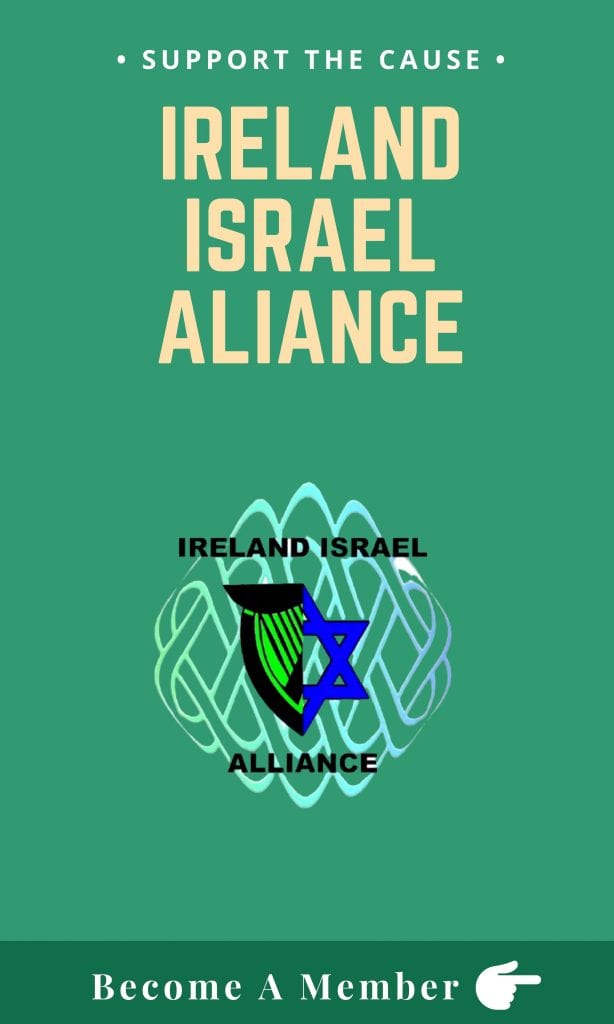Two days before the publication of David Collier’s report into antisemitism in Ireland, Deputy Catherine Connolly (an independent TD from the Galway West constituency) put the following Dáil question to the Minister for Foreign Affairs, Simon Coveney:
[I]f his Department by indicating support for the Jewish character of the Israeli state agrees with the treatment by Israel of Palestinian communities in its attempts to accomplish Jewish supremacy; his views on whether these attempts to perpetuate the supremacy of Jews over Palestinians amount to apartheid; and if he will make a statement on the matter?
Simon Coveney’s response took no issue with her use of the term “Jewish supremacy” which – as pointed out in a press release by the Jewish Representative Council of Ireland (JRCI) – strayed into classic antisemitic language with its perpetuation of anti-Jewish tropes. Coveney’s reply makes reference to concerns about the rights of “non-Jewish citizens” of Israel and those of the “Palestinian minority” and affirms that he will continue to “raise[] these issues consistently and vocally, both publicly and in conversations with Israeli government interlocutors”.
There are a few points to be made about this exchange. Firstly, while Simon Coveney might like to refer to the Israeli-Arab community as Israel’s “Palestinian minority”, members of that same community consider themselves to be primarily “Israeli Arab” or simply “Israeli”. Only 7% regard themselves as “Palestinian”.

Secondly, Deputy Connolly takes issue with the “Jewish character of the Israeli state”. Israel does indeed regard itself as a Jewish state, the only one in the world where Jews can feel completely safe, knowing that their rights are fully protected and not subject to the whims and swings of politics. The idea of a state identifying itself with a particular religion might be anathema to leftists such as Deputy Connolly but it’s hardly unique. The Anglican Church of England is the established church in that country, the Presbyterian Church of Scotland is the national church there and the state Lutheran churches are the established churches in Denmark, Iceland, and Finland.
In fairness to all the previous examples, the churches don’t exercise much political influence although in England and Norway, the head of state must be a member of the state church. No such restrictions apply in Israel where the head of state can be of any religion or none. Also, each individual confessional community has complete freedom in terms of practices of particular religious significance such as baptism, marriage, communion, bar mitzvah, bat mitzvah, confirmation etc.
Of much greater significance is how Israel compares with its neighbours in the Middle East. The contrast couldn’t be greater. Across vast swathes of the world from north-west Africa to south-east Asia, states give Islam a supreme status. In Jordan, Egypt, Iran, Iraq, Saudi Arabia, Qatar, Oman, United Arab Emirates, Yemen, Somalia, Libya, Tunisia, Algeria, Morocco, Afghanistan, Pakistan, Bangladesh, and Malaysia, Islam is the state religion. In many of these states, Islamic law is accorded a superior status that in many cases can’t even be legally challenged.
Some of these countries do guarantee freedom of religion to non-Muslims. Nevertheless, in Algeria, Egypt, Iran, Iraq, Syria, Saudi Arabia, Pakistan, and Nigeria, being a non-Muslim can be problematic (the case of Nigeria being in reference to certain northern states of the federation), The point also applies in Afghanistan, Somalia, Sudan, Eritrea, Libya, and Yemen,. In Saudi Arabia, there is no freedom of religion. The public practice of any religion other than Islam is prohibited, and there is no separation between state and religion.
The public record suggests that Deputy Connolly has either no knowledge of or no interest in the above examples. There can be no argument that the situation of religious minorities across vast swathes of the Middle East and North Africa are far worse than those in Israel. Only she can explain why she has such a narrow focus on the only stable democracy in the region.
Since 2014, there have been a number of polls on the levels of antisemitism in Ireland. Details can be seen here, here and on pages 34 and 36 in this download link. They suggest that somewhere between 10% and 30% of Irish people harbour anti-Jewish attitudes. Surprisingly, this is quite low compared to other European countries.
What makes Ireland different from other countries – as David Collier’s report points out – is the degree to which the political class is obsessed with demonising Israel and how this is increasingly spilling over into outright antisemitism that’s been driven from the top down. The inevitable result will be a country where Irish Jews simply don’t feel welcome any more.
By Ciarán Ó Raghallaigh




